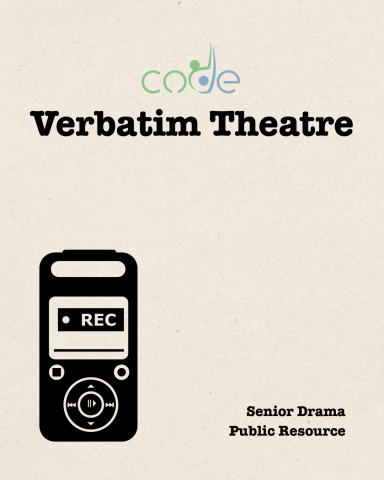
Unit Overview

The Verbatim Theatre unit will be scaffolded through voice, movement, storytelling and interviewing activities to invite students into the process of recreating 'reality' both as an actor and as a writer. The unit will culminate in a polished performance piece that was developed from earlier lessons.
Unit Guiding Questions
- What is Verbatim Theatre? Why is it important and compelling?
- What are the challenges of creating Verbatim Theatre? What tools are available to the artist to create Verbatim Theatre?
- What ethical considerations must be demonstrated when creating Verbatim Theatre?
- How can a Verbatim Theatre piece be edited?
- What happens to the 'truth' when it is shaped, revised and interpreted through an actor?
- What can we learn about ourselves through telling and listening to personal stories? What can we learn about our society?
- How can we use Verbatim Theatre to educate and eventually change social views and practices?
Assessment and Evaluation: How will students demonstrate their learning?
Assessment for Learning (AfL)
Check Point #1/Lesson 1
- Feedback on written version of stories
Check Point #2/Lesson 2
- Teacher observations using PDF #1 Creative Process Observation Anecdotal Records
Check Point #3/Lesson 3
- Teacher Feedback on Creation Process
Check Point #4/Lesson 4
- Written teacher feedback on Composite Character Monologue
- Oral feedback from teacher and class on Composite Character Monologue
Check Point #5/Lesson 5
- Peer Feedback on Performance using Co-constructed Rubric
Assessment of Learning (AoL)
- Students will be evaluated on their rehearsals using the Creation Process Observation Anecdotal Records.
- Students will be evaluated on the performance of the monologue using the Verbatim Theatre Monologue Performance Rubric that was co-constructed by the class.
- Students will be evaluated on their Verbatim Theatre Reflection.
Unit Lessons and Guiding Questions: How will assessment and instruction be organized for learning?
Lesson
Focus
Anticipated Duration
Lesson 1
Telling Other People's Stories
In this lesson, students will experience and reflect on the process that lies at the heart of Verbatim Theatre: telling other people's stories. Beginning with their own stories, students will learn to make respectful observations about their classmates and re-tell a classmate's story in role.
2 classes
(1 class = 75 minutes)
Lesson 2
Defining and Creating within the Genre
In this lesson, students will be introduced to the concept of Verbatim Theatre by broadly defining the term verbatim as it applies to theatre. Students will differentiate between verbatim theatre and docudrama by investigating and presenting a newspaper article in the style of each genre. Students will build on their experience with dramatic forms by incorporating tableau, choral speaking and movement into each presentation.
3 classes
Lesson 3
The Overheard Conversation
In this lesson, students will revise and perform two versions of their Overheard Conversation Assignment from the previous lesson. Students will learn about and reflect on the revision process that may occur while creating Verbatim Theatre.
1-2 classes
Lesson 4
The Composite Character Monologue
In this lesson, students will learn about composite character creation in Verbatim Theatre by seeing examples from contemporary theatre. Through interviews with many classmates, students will create composite character monologues.
1-2 classes
Lesson 5
Polishing and Performing the Verbatim Text
In this culminating task, students will create a polished performance from another student's monologue that was developed in Lesson 1 or 4. Through acting techniques and activities, students will make the character specific and receive feedback as they build toward a performance.
3 classes
